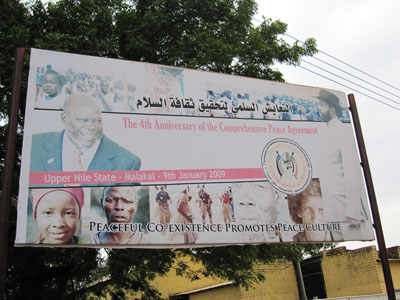
MALAKAL, Upper Nile State, Southern Sudan – “No one wants to give up Malakal,” a Sudanese civil society leader from the Shilluk ethnic group – and former southern liberation army soldier in Sudan’s 23-year long civil war – told me. Today, almost five years after the Comprehensive Peace Agreement that ended this war was signed, Malakal remains a strategic town that neither the Khartoum regime nor the semi-autonomous Government of Southern Sudan seem ready to relinquish without a fight.
As the capital of Upper Nile state, Malakal falls squarely within the South’s borders as determined at independence in 1956 and affirmed by the 2005 CPA. However, despite the fact that Malakal is undoubtedly in the South, it remains a strategic town that both the Khartoum regime and the Government of Southern Sudan seek to control. Upper Nile is the only state in the South where the governor is from Khartoum’s National Congress Party, or NCP. The CPA dictated that one of the 10 states in southern Sudan would have a NCP-appointed governor, and, unsurprisingly, Upper Nile was the state chosen for this high-level NCP representation.
Since the CPA was signed, there have been two serious clashes between Sudan Armed Forces, or SAF, troops from the North and SPLA troops from the South, which highlight Malakal’s status as a battleground whenever North-South tensions ignite. Although the SAF and SPLA troops are supposed to be working together as “Joint Integrated Units” (another CPA provision), the local wisdom in Malakal is that the JIUs are the biggest security threat to civilians. They have moved to separate barracks across town from each other, and are now not even attempting to be joint or integrated.
In this environment of mistrust, a political drama is unfolding. Upper Nile state governor Galwak Deng Garang, appointed by the NCP in 2008, was recently ordered to relinquish his post to Dr. William Adok, a lesser known man from the Shilluk ethnic group (a minority group in southern Sudan whose population lives almost exclusively in Upper Nile). Given that the governor was appointed by his own party, the NCP, the decree signed by President of Southern Sudan Salva Kiir was viewed only as a formality; the decision was clearly driven by Khartoum, although rumors abound regarding who exactly within the NCP pushed this move.
The governor himself maintains that President Bashir—a close friend from their time together in the northern army—was not behind this decision. Above all, Governor Deng Garang stressed in an interview with Enough last week that he has not been personally informed of the decision to remove him, and that it is humiliating to him that neither the southern Sudanese President Kiir nor President Bashir have contacted him directly.
While the governor’s rationale sounds fairly reasonable, his decision to hold onto his position has stirred tensions yet again in this already volatile town. Nuer youth have posted petitions claiming that they will protect Governor Deng Garang and attack anyone who attempts to remove him or to welcome his replacement. Voter registration numbers in Malakal have dropped markedly in the past week according to the Upper Nile State High Committee. The already restless JIU troops—both the northern and southern contingents—have reportedly received visits from the governor, and one story circulating the streets of Malakal is that the governor may have paid the northern SAF troops to guarantee their support in case he needs it. The governor, a former Major General, has also taken to wearing his SAF military uniform, although he was not in uniform when Enough interviewed him at his residence overlooking the Nile river.
The ongoing standstill over the Upper Nile governorship may not be broken without a serious deterioration of the security situation on the ground here in the state capital. Meanwhile, absent news from Khartoum or Juba, Governor Deng Garang is holding onto his post, and the waiting game in Malakal continues. “I can’t predict the weather,” a Darfuri trader explained to me via my Arabic translator, “but I would not be surprised if things get stormier in the days to come.”

